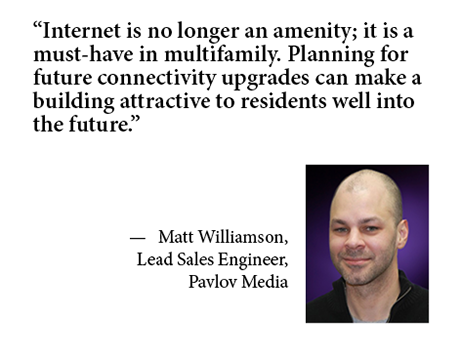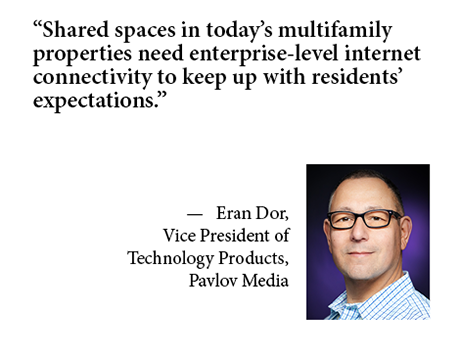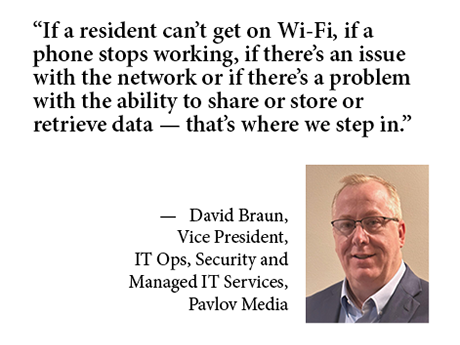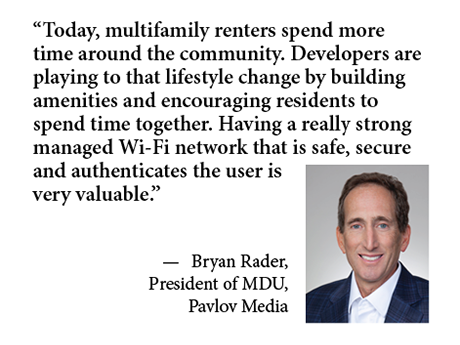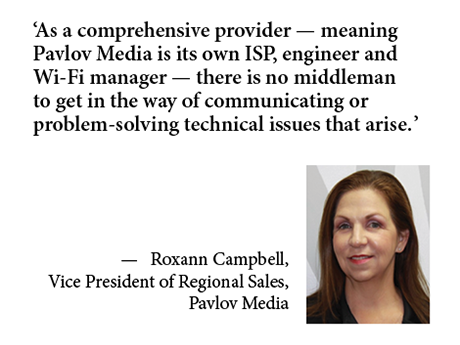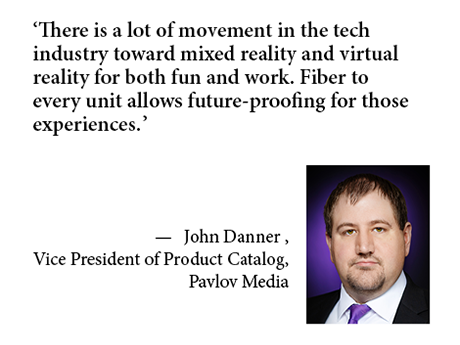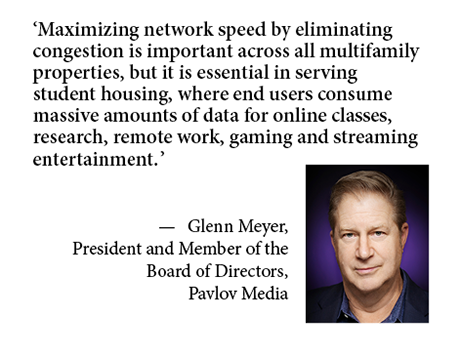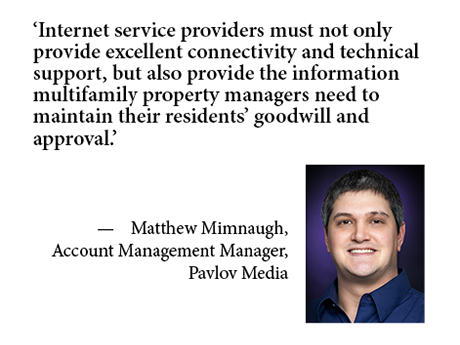In the rapidly evolving landscape of multifamily technology, owners and operators face a critical challenge to staying competitive. As demand for high-speed internet and robust connectivity grows, it is essential to adapt quickly. However, constantly upgrading infrastructure can be prohibitively expensive and time-consuming. The solution lies in future-proofing properties — building an adaptable infrastructure that can support unknown future technological needs. “Future-proofing is a matter of having infrastructure capable of supporting what we don’t know we will want later,” says Matt Williamson, lead sales engineer at Pavlov Media, which provides Wi-Fi, fiber-optic internet service and managed digital services to multifamily properties. Future-proofing involves implementing scalable and flexible communication systems that accommodate both current and emerging digital demands. By focusing on future-proofing, multifamily properties can meet residents’ increasing expectations for high-speed internet and comprehensive Wi-Fi coverage while also reducing operational costs and enhancing overall efficiency. Balance Current Needs with Future Trends “Multifamily residents now expect extremely high-speed internet connections in their units and throughout the entire property, including common areas like gyms, conference rooms, pools and walking paths,” Williamson says. Residents want robust internet connections for activities such as streaming, video calls and remote home monitoring. The importance of upload speeds …
Pavlov Media
Content PartnerDevelopmentFeaturesLeasing ActivityMidwestMultifamilyNortheastPavlov MediaSoutheastTexasWestern
Content PartnerDevelopmentFeaturesLeasing ActivityMidwestMultifamilyNortheastPavlov MediaSoutheastTexasWestern
How Developers Use Mix of Technology, Amenities to Attract Residents
The multifamily industry faces a major challenge. Final construction costs have grown 33 percent since 2019 interest rates and operational expenses are sky high; and rents may need to increase, where possible, to make deals feasible — an off-putting reality for residents. One developer solution is smaller apartments, which make units cheaper. There is also a push to add more common-space amenities that are both valuable and less costly to include. These features include rooftop spaces, green areas and decks. However, to make these spaces truly usable for today’s multifamily residents, it is important to make them technologically flexible and to offer easy internet connection. “The floor plans of most new-construction multi-dwelling units (MDUs) today are shrinking, and their amenities are expanding,” says Bryan Rader, president of MDU at networking and internet service company Pavlov Media. According to RentCafe, the average size of newly constructed apartment units fell by almost 6 percent in a decade, with half of that change occurring in the last year. Rader likens it to the “resort-style community” approach, where hotel rooms are small, and guests are encouraged to spend time everywhere else on the property. Similarly, multifamily developers create shared amenities such as comprehensive fitness …
The multifamily industry has its hands full: finance in adverse economic conditions, rapidly rising operation costs, as well as the challenge of attracting and keeping quality tenants as the biggest jump in new inventory creates more competition than the industry has seen in decades. Technology is an enabling and defining tool in the midst of these challenges. Tenants often expect services like internet access, telephone, television and Wi-Fi hotspots throughout a complex. Multifamily property staff need data access, speciality software, as well as the ability to schedule prospective resident visits, remote viewing, maintenance and more. Relatively few multifamily operations have the scope, scale and economics for an IT staff that can handle the support and repair requirements necessary to install systems, keep them working, protect data and networks while assisting tenant and staff users, particulary 24 hours a day, 7 days a week. Managed IT services are third-party companies that remotely provide the IT expertise and the help a company requires. “If a resident can’t get on Wi-Fi, if a phone stops working, if there’s an issue with the network or if there’s a problem with the ability to share or store or retrieve data — that’s where we step …
Content PartnerDevelopmentFeaturesLeasing ActivityMidwestMultifamilyNortheastPavlov MediaSoutheastTexasWestern
Multifamily Operators Adopt Property-Wide Internet Access as New Standard Amenity
Multifamily residents want to take their internet connections with them beyond their unit’s four walls and throughout the complex. The National Multifamily Housing Council has found for years that 90 percent of renters say good internet access is a necessity. But the meaning of good connectivity has changed. “Ten, fifteen or twenty years ago, the most popular trend was cocooning — where people would go to work, come home and run into their apartment. They’d close the door, and you wouldn’t hear or see from them again until the next day,” says Bryan Rader, president of MDU at internet service provider Pavlov Media. “Today, multifamily renters spend more time around the community,” he continues. “Developers are playing to that lifestyle change by building amenities and encouraging residents to spend time together. Having a really strong managed Wi-Fi network that is safe, secure and authenticates the user is very valuable.” Put more simply, Wi-Fi within amenities is important to renters. Take fitness centers, for example. When was the last time you saw anyone on a treadmill without headphones relaying music from the internet through a phone or tablet? The move toward property-wide internet demand started in universities as students needed internet …
Internet connectivity is the digital equivalent of a foundation for any multifamily property. Residents want access for communications, entertainment, business and personal needs. Property operators need connections for management and reporting software resources. Good and reliable connections to the Internet, and a dependable Wi-Fi network as a way of distributing that access, are essential. Looking three to five years into the future, these connectivity needs become even more demanding and complex. The Internet of Things (IoT) creates a layer of interesting application and use cases for property owners. IoT defines the collective network of connected technology that enables communication between devices (“things”) and the cloud and/or among the devices themselves. IoT devices are the technology that creates smart home and buildings. IoT devices also support and simplify functions such as rental property management, energy usage reduction, maintenance cost reduction and more. “Looking into the future, IoT applications can make the property more efficient in surprising ways,” says Eran Dor, vice president of technology products at Pavlov Media. Leak detectors can provide early warning of flooding and appropriately shut off water before any significant damage occurs. Trash cans can be equipped with sensors that indicate when to collect, rather than requiring …
“Traditional wired and wireless networks are becoming faster and more reliable with each new standard on the market,” says Pavlov Media CEO Cory Douglas. “We’re seeing multifamily consumers extend these data networks well beyond the need for just for voice and video. There are all kinds of new demands on multi-dwelling units (MDUs) for integrating Internet of Things (IoT), life safety and power and water management systems into traditional data networks.” For more than 30 years, Pavlov Media has been the leading national provider of residential Wi-Fi service, and now, with Douglas as the company’s newly named CEO, Pavlov Media has plans to build on its success through its unique technology and its eye on the innovation required by multifamily’s evolving needs. Douglas, promoted to replace retiring founder and CEO Mark Scifres, says what sets Pavlov Media apart is its ability to rapidly implement broadband Wi-Fi and video solutions for any style of community, located in any part of the country. “That capability is really driven by the investments in our back office, technology and engineering workflows that we’ve developed over time,” Douglas explains. “It’s our goal to make the purchasing and deployment experience easy for our customers. It’s done …
Day-to day life as a property manager in both a conventional multifamily building and student housing can be unpredictable. Hiring and staffing issues can plague many operators, resulting in the need to wear many different hats. These different hats can make it difficult for staff to fully address all of the residents’ needs. Managing a Wi-Fi system — perhaps the most crucial technology platform at any community — is one duty that the onsite team can happily offload to a third-party provider. Reliable Managed Wi-Fi Systems Roxann Campbell, vice president of regional sales at Pavlov Media, says today’s Internet-connected culture has increased the need for residents to have an absolutely reliable managed Wi-Fi system. Pavlov Media (which provides Wi-Fi & fiber services to multifamily and student properties) is an Internet service provider (ISP) that can establish connectivity throughout entire buildings while managing Internet for all of a property’s residents. This managed Wi-Fi approach benefits the buildings’ owner-operators because it offers a planned strategy for wiring and Wi-Fi signals. Routers aren’t competing against each other, as they can in communities that give their residents the option to sign up with any number of competing Internet providers. “Bulk managed Wi-Fi provides residents …
Technology, like commercial real estate, becomes increasingly vulnerable to the need for replacement and updates over time. Just as multifamily landlords can update properties by periodically replacing outmoded flooring and fixtures to suit the latest occupier preferences, technology must also keep up with the latest trends. For the best renter experience, multifamily properties need Internet connectivity that will serve residents as their technological needs grow and their tolerance for frequent outages diminishes. Disruptions associated with repairs or network upgrades can threaten customer satisfaction and renewal rates. Unfortunately for many landlords who rely on traditional telecommunications lines for their properties’ Internet, modern usage is straining older infrastructure. Booming wireless technology use is gobbling up bandwidth to connect everything from consumers’ phones and laptops to fitness monitors, smart TVs and other household appliances. As a vice president of product catalog who has worked for over a decade at broadband service provider Pavlov Media, John Danner understands the problem of limited Internet bandwidth all too well. He is eager to see technological improvements that will replace these old systems. “The old copper infrastructure can’t meet the requirements of the next generation of wireless connectivity,” explains Danner. “With fiber-optic connections, the sky is the …
Pavlov Media is accelerating the expansion of its fiber network and fiber-to-the-home initiatives with a key investment from the world’s largest infrastructure investor, Macquarie Asset Management. The funding will help Pavlov Media augment its coverage of student and multifamily housing, developing and broadening resident access to high-speed Internet across a variety of property types. “We are ramping up our growth plans with a combination of building municipal fiber networks in college towns and extending service to underserved areas adjacent to our core markets,” says Glenn Meyer, board member and president of Pavlov Media. “It’s basically more of what we have already been doing but on a larger scale.” Pavlov Media is already the nation’s largest private provider of fiber-based Internet and video services to off-campus student housing, connecting properties in more than 150 U.S. markets and Canada to its national backbone via its own last-mile, municipal fiber networks and third-party circuits. The Champaign, Illinois-based company serves approximately 1,000 multifamily and student buildings encompassing more than 285,000 beds, and in recent years has begun extending fiber to customers in areas adjacent to its core student-housing markets. Now the broadband service provider is poised to quicken the pace of its growth with …
By Matthew Mimnaugh, account management manager, Pavlov Media Account management, or the work to ensure repeat business and expand each client relationship, requires more than simply satisfying customers. For Internet service providers (ISPs) to the multifamily industry this means helping property managers succeed by maximizing their residents’ connectivity. Excellent Internet service leads to positive property reviews and renewed leases. Property ownership and management win. Providers that serve landlords best not only respond to service requests, but also employ a deductive approach to diagnose root problems, discover unreported deficiencies and take preemptive actions that allow smooth property operations. Below is an overview of best practices for account management and a discussion of Pavlov Media’s data analysis and behavioral pattern recognition tools we’ve developed to uncover trends and issues that can threaten connectivity and, ultimately, property performance. First Responders Giving housing managers and their residents access to a technology support team is a standard practice for many ISPs. Typically, a request generates a service ticket, and a team member responds to gather basic information before walking the customer through a scripted trouble-shooting tree to either solve the problem or elevate the ticket for more advanced assistance. This approach can be highly effective …
Newer Posts


